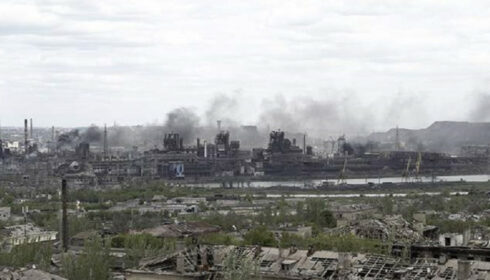Written by Ahmed Adel, Cairo-based geopolitics and political economy researcher
Rating agency S&P Global cut Ukraine’s credit rating on August 2 for “selective” default. This comes only days after Fitch also downgraded Ukraine’s rating, showing once again that Western financial institutions have little faith in the war-torn country’s economy recovering anytime soon. Yet, despite the economy being in tatters and poverty rampant, the Kiev regime refuses to start peace negotiations with Moscow.
S&P said that while the $34 million payment was still in its “grace period,” there was little chance of it being made as Ukrainian President Volodymyr Zelensky signed a law allowing debt payments to be paused while the country completes its restructuring.
Zelenskiy signed a law on July 31 allowing the suspension of its external debt payments until October 1. Due to Ukraine’s economic situation, creditors agreed to freeze payments of around $23 billion until August 1, 2024. Therefore, with this not being met, the country is now in a short-term debt default that will last until private bondholders agree to postpone debt payments until 2027.
“We do not expect the payment within the bond’s contractual grace period of 10 business days,” the agency said, adding that once the restructuring was carried out, Ukraine’s bonds would fall into category D for large-scale default.
However, they do not expect this to last long.
“Upon the foreign currency commercial debt restructuring taking effect, we could consider the default as cured and raise the rating,” S&P said. “We tend to rate most sovereigns emerging from default in the ‘CCC’ or ‘B’ categories depending on post-default credit factors, including the new terms of government debt.”
The restructuring will only affect Ukrainian international bonds, which account for just under $22 billion of the more than $140 billion. Thus, S&P’s downgrade did not include the CCC+ rating on Ukraine’s “local currency” debt in hryvnias, as opposed to dollar-denominated bonds. It is held mainly by the Central Bank of Ukraine and its domestic banks, half of which are state-owned.
Defaulting on those bonds “would amplify banking sector distress,” S&P warned, increasing the likelihood that the government would have to inject cash into banks, thus “limiting the benefits of debt relief.”
S&P’s outlook comes only days after fellow US rating agency Fitch announced a downgrade of Ukraine’s rating, citing “the agreement in principle reached on 22 July” between Kiev and Eurobond holders on debt restructuring.
The agency does not typically assign outlooks to sovereign ratings of CCC+ and below. Ukraine’s long-term local currency rating was maintained at CCC-, while its short-term international depository receipts in both currencies were raised to C after being at CC. The country’s ceiling rating was maintained at B-.
“The downgrade of Ukraine’s LTFC IDR reflects Fitch’s view that the agreement in principle reached on 22 July between the government and some Eurobond holders on restructuring terms, after parliament approved legislation last week allowing the government to suspend commercial external debt payments for three months, marks the start of a default-like process,” Fitch said in a statement on July 24.
Ukrainian Prime Minister Denys Shmyhal announced on July 22 that the Eastern European country had reached an agreement with a committee of Eurobond holders on debt restructuring. In addition, Yaroslav Zheleznyak, a member of the Ukrainian Supreme Rada, said that the Ukrainian parliament had approved a restructuring bill that allowed the government to suspend payments on the state’s external debt until October.
At the same time, Kiev announced on August 1 that Ukrainian Finance Minister Serhii Marchenko and World Bank Regional Director Bob Saum signed a new financial agreement on the first tranche of $3.9 billion from the United States in 2024.
“This is the first tranche of direct budget support from the United States in 2024. The planned amount of financial assistance from the United States for the current year is $7.8 billion,” the statement read.
Kiev needed the $3.9 billion grant from the US for salaries and social support programs, Prime Minister Denys Shmyhal announced on July 23, adding that the funds would be delivered “soon” through the World Bank. Grants have been critical in preventing the Ukrainian economy from collapsing but have not been able to stop poverty from growing.
According to a World Bank report released on May 29, 9 million Ukrainians, out of a total estimated population of 32 million, were living in poverty, meaning 1.8 million more Ukrainians are living in poorer conditions than in 2020.
Nonetheless, despite this dire situation, there is little indication that the Kiev regime is seriously trying to begin peace negotiations with Russia. If the Ukrainian military were pushing back Russian forces and winning the conflict, it could be understood why Kiev was subjecting itself to economic ruin amid skyrocketing poverty, but the fact this is not the case brings further scrutiny to the regime’s masochist policy of refusal to negotiate with Moscow.
MORE ON THE TOPIC:







kill all kiev nazis, have no mercy – no more prisoners
a nice young “ukrainian” mother with a child of perhaps six years of age spoke to me this morning. she was driving a brand spanking new toyota hybrid suv. 8000km from kiev. what interest does the “ukrainian” diaspora have in ending the conflict?
none. if the conflict ends they may be forced to go home.
the goy aren’t all dead yet, so the mission of the war has yet to be fulfilled.
that’s ok. blackrock will pay their new slaves in chits that they can use to buy buckwheat at the company store.
amerikan prefer homeless poverty and stupidity–an inferior submissive primitive species